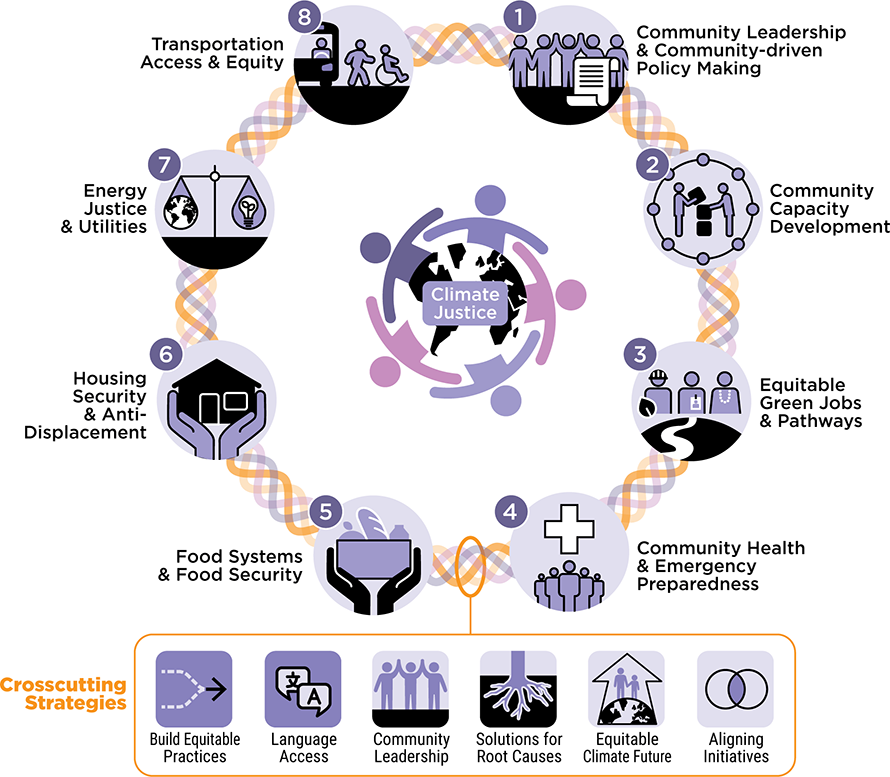Climate Equity Community Task Force (CECTF)
Developing the first climate justice framework for King County
As part of King County’s commitment to action on climate change and equity and social justice (ESJ), the 2020 Strategic Climate Action Plan (SCAP) includes a new Sustainable & Resilient Frontline Communities (SRFC) section focused on climate equity and community-driven policy.
This new section of the SCAP represents the first climate justice framework for King County, and first community-driven policy-making process for our climate work.
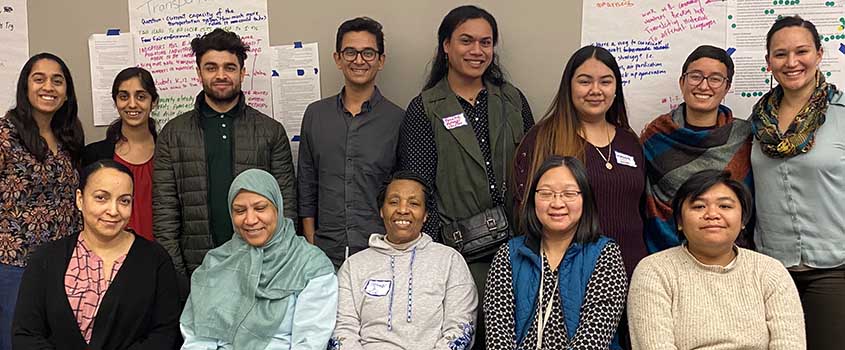
Working on the solutions with those most impacted by the issues
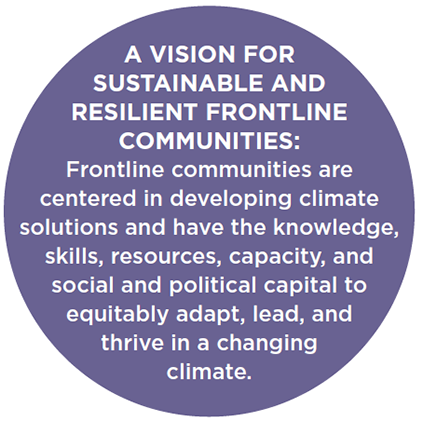
The SRFC framework was developed through a community-driven process where leaders of frontline communities developed the goals and guided the priority areas for climate action based on community values and climate justice concerns. Frontline communities are those that will be disproportionately impacted by climate change – these are the populations that often experience the earliest and most acute impacts of climate change, face historic and current inequities, and have limited resources and/or capacity to adapt.
Many communities experience climate change on a local level and have come up with innovative solutions to manage daily impacts. Yet, despite having critical expertise around the challenges created by climate change and being uniquely equipped to come up with solutions that benefit everyone, members of frontline communities often struggle to find a seat at decision-making tables because of a wide variety of barriers, from financial to institutional. King County sought to elevate and center the voices of impacted communities in leadership and decision-making tables, and in community-government partnerships that exemplify equitable engagement.
The process
Acknowledging that it takes time to build trust and relationships, early community engagement efforts from 2017-2018 were focused on building partnerships with frontline community organizations, supporting and investing in community leadership development, collaborating on co-created translated (transcreation) climate communications materials in multiple languages, conducting youth workshops, and building capacity both internally and externally around community-driven climate policy-making.
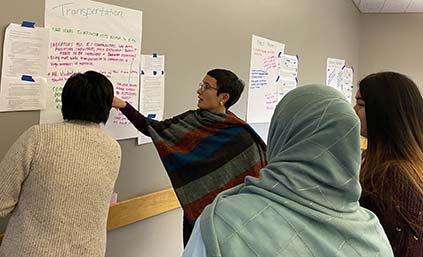
Convened in the spring of 2019, The Climate Equity Community Task Force (CECTF) is a group of leaders who represent frontline communities and organizations across greater King County, bringing multi-ethnic and multi-racial cross-sector experiences to climate-related community building. The CECTF was the primary body for identifying community-driven climate actions for the 2020 SCAP and the SRFC section, working with the support of an internal advisory team of staff from across a wide range of King County departments (including the Dept of Community & Human Services, Dept of Natural Resources & Parks, Metro, Public Health, Dept of Local Services, Office of Equity & Social Justice, Climate Action Team, and Office of Emergency Management). The task force included 22 community leaders, representing many different frontline communities, which includes Black, Indigenous, and people of color (BIPOC) communities, immigrants and refugees, people living with low incomes, communities experiencing disproportionate pollution exposure, and other climate-vulnerable groups, women and gender non-conforming, LGTBQ, those with existing health issues (like asthma and heart disease), people with limited English skills, and those experiencing pregnancy.
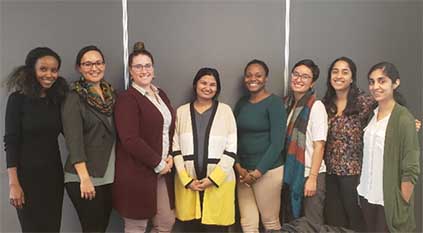
This group of community leaders met approximately bi-monthly over 2 years, using an interactive, collaborative visioning process that valued long-term and transformative relationships, acknowledged power dynamics, worked to remove barriers to participation, and compensated community members for their time and expertise. A key responsibility of participants was to bring their own unique voice and experiences, as well as perspectives from their communities to develop a shared vision for sustainable and climate-resilient frontline communities in King County.
Despite having to adapt to the impacts of the COVID-19 pandemic, which was also disproportionately impacting BIPOC communities, CECTF members were dedicated and committed to seeing this work through, and addressing underlying systemic causes to climate inequity. The CECTF identified and developed 31 community-driven and equity-oriented climate actions across 8 key focus areas in the SRFC section, some of which are cross-referenced in the GHG reduction and Climate Preparedness sections.
The task force has developed recommendations on climate actions and priorities across the SCAP with a focus on climate equity that recognizes agency for frontline communities, mitigates environmental injustices, ensures equitable distribution of environmental benefits, and recognizes intersections with other social issues.
Key focus areas and crosscutting strategies of the SRFC framework: advancing climate and equity in frontline communities
Sustainable & Resilient Frontline Communities focus areas
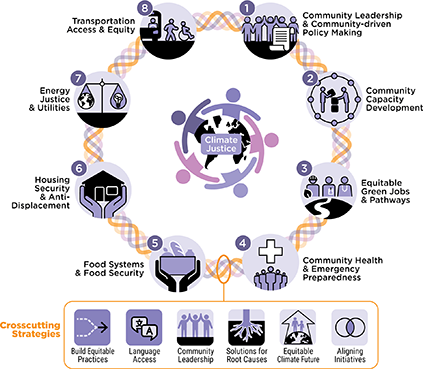
Click, tap or enter to enlarge
The CECTF community-driven process identified a structure that outlines eight equity-driven focus areas and several priority actions for each focus area. The focus areas are premised on the six crosscutting SRFC strategies and address key areas of concern across the 8 focus areas. The focus areas and associated actions provide pathways to ensure that all communities and all people of King County can benefit from coordinated climate change actions and can contribute their vision and expertise to a shared ecosystem of climate solutions . The SRFC section provides a framework for action to move forward social and economic reforms needed to mitigate disproportionate climate impacts on frontline communities. The focus areas envisioned by the CECTF offer pathways to a more equitable and just climate future for all – and one that is emergent from the unique lived experience and visions of the frontline communities across King County. The SRFC section highlights eight focus areas and associated actions to increase climate resiliency and mitigate disproportionate climate impacts on frontline communities.
Acknowledgements
Thank you to all the members of the Climate Equity Community Task Force (CECTF), and their communities, who contributed their expertise and insights to the development of the Sustainable & Resilient Frontline Communities section. Special thanks to Jamie Stroble, former Climate Equity & Community Partnership Program Manager, who founded the CECTF and led the development of the SRFC section for the 2020 SCAP. We acknowledge and appreciate that this work was made possible by the community-scale and regional climate justice efforts and leaders that came before us. For additional acknowledgements, particularly of all the integral King County staff and interns that supported this work, please refer to page 2 of the full 2020 SCAP.
CECTF members and community affiliations:
Hoda Abdullahi, Living Well Kent
Colleen Alabi, Mother Africa
Analia Bertoni, Villa Comunitaria
Magdalena Angel Cano, Duwamish River CleanupCoalition, Duwamish Valley Youth Corps, Rainier Valley Corps Green Pathways Fellow
Everly Moey Faleafine, U.T.O.P.I.A. (United Territories of Pacific Islanders Alliance) Washington
Tweetie Fatuesi, U.T.O.P.I.A. (United Territories of Pacific Islanders Alliance) Washington
Niesha Fort-Brooks, Community Leader; Healthy King County Coalition – Built Environment Workgroup Co-chair; Metro Mobility Equity Cabinet Member; King County Open Space Equity Cabinet Member
Njambi Gishuru, Food Innovation Network (FIN) – a program of Global to Local (G2L)
Adrienne Hampton, Duwamish River Cleanup Coalition
Vera Hoang, Got Green
Taffy Johnson, U.T.O.P.I.A (United Territories of Pacific Islanders Alliance) Washington
Jill Kong, Food Innovation Network (FIN) – a program of Global to Local
Sameth Mell, Spean Rajana, Equity in Education Coalition, King County International Airport Community Coalition
Pah-tu Pitt, Co-owner of Native Kut, Member of the Confederated Tribes of Warm Springs, Metro Mobility Equity Cabinet Member
Risho Sapano, Mother Africa
Andrew Schiffer, DIRT Corps
Veronica Villareal, DIRT Corps
Dinah Wilson, Kent Cultural Diversity Initiative Group, City of Kent
Karia Wong, Chinese Information Service Center (CISC)
Nourah Younus, African Women’s Business Alliance
The final 2020 Strategic Climate Action Plan, including the Sustainable & Resilient Frontline Communities section and the work of the Climate Equity Community Task Force, was transmitted by King County Executive Dow Constantine to the King County Council in August 2020 and was adopted in May 2021.
In recognition that we build off of the work of those that have come before us, we would like to share a few of the key equity and environmental justice resources that influenced the CECTF Process:
- Equity and Social Justice Strategic Plan 2016-2022 – King County
- Blueprint for Addressing Climate Change and Health (2018) - King County
- Communities of Opportunity – King County, Seattle Foundation
- Guide to Equitable Community-Driven Climate Preparedness Planning (2017) - Urban Sustainability Directors Network (USDN)
- Community-Driven Climate Resilience Planning (2017) – Movement Strategy Center
- Our People, Our Planet, Our Power (2016) - Got Green & Puget Sound Sage
- Environment & Equity Agenda (2016) – City of Seattle
- Climate Action Through Equity (2016) – City of Portland and Multnomah County
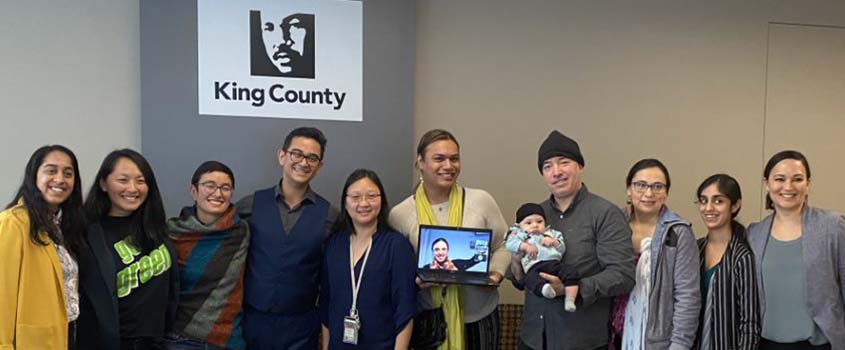

 Translate
Translate
